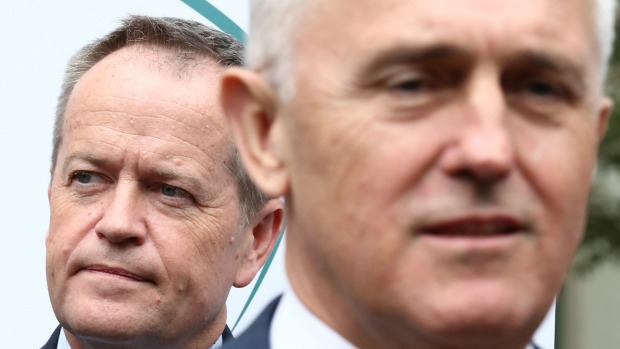Instead of sacking scientists, the Coalition could embrace climate policy consensus.

Labor in focus: Bill Shorten and Malcolm Turnbull. PHOTO Alex Ellinghausen/Fairfax Media
It had to happen. CSIRO’S announcement last week that it would set up a Hobart “climate centre” was forced by a storm of international and local protest at its proposal to cut climate science jobs.
There’s plenty of reason to see this as no more than window-dressing – an attempt by beleaguered CEO Larry Marshall and his political masters to put the best possible gloss on a bad situation.
Science community pressure and lobbying by federal and state politicians pushed Marshall to limit sackings. But even if no more than 15 Hobart-based positions are to go, as he now says, that’s still 15 or so too many.
Politicians know a lot about popular opinion. Even those who question global warming are conscious of a growing public sense that scientific climate models have basically got it right and we’re going to need all the brainpower we can muster to deal with the consequences.
Some consequences projected in the models are here already, including 2½ years of unprecedented global surface warming and multi-year heating and acidification of ocean waters. Scientists put most of this down to our carbon emissions.
The emissions graph is getting steeper. Readings at Tasmania’s Cape Grim station are nudging 400 parts per million for the first time in the station’s 40-year history, and the reading at Mauna Loa in Hawaii just topped 409 ppm – a 30 per cent rise in less than 50 years.
Labor responded to this drawn-out crisis last week with a policy aiming at 50 per cent of electricity from renewable sources in 2030 and an emissions target based on recommendations of the Climate Authority in its report to environment minister Greg Hunt last November.
The party’s aim to have emissions 45 per cent lower in 2030 than they were in 2005 seems ambitious, but isn’t really. We remain behind front-runners UK and Switzerland, and the sum of national targets still leaves the world well short of what’s needed to limit warming to 2C.
As for cost, Bill Shorten and his climate spokesperson, Mark Butler, pointed to independent modelling showing the economic impact of the higher target would be just 0.3 per cent more than the Coalition’s ineffectual Direct Action policy.
When Shorten said “there will be no carbon tax under Labor”, he opened the door to a predictable Liberal response that he was Gillard’s “carbon copy”, but the Coalition’s “electricity tax” line of attack won’t have the same impact this time round.
Unlike its 2011emissions trading scheme, Labor’s new scheme is split into two components, one for electricity and another for heavy industry, and uses a “baseline and credit” principle – the idea that Malcolm Turnbull espoused as opposition leader in 2009.
Following the recommendation of the Energy Market Regulator, Labor’s electricity emissions scheme will aim for a balance between power generators whose emissions fall above the baseline and those below it, allowing a revenue-neutral outcome at no net cost to consumers.
Noting structural similarities between the Coalition’s Direct Action policy and Labor’s scheme, the Business Council of Australia hailed the latter as “a platform for bipartisanship”.
This may be the first Australian election campaign in which climate policy is front and centre. In 2007 John Howard didn’t want to talk about it. In 2010 Tony Abbott only wanted to talk about his opponents’ policies. That might have helped win the 2013 election, but it won’t work again.
A perceptible shift in public opinion means that voters won’t tolerate a do-nothing approach. Instead of banging on about electricity taxes, Malcolm Turnbull could neutralise climate change as an issue by revisiting his 2009 scheme and giving Direct Action the teeth it desperately needs.
But if his party rejects bipartisanship on climate in favour of opposing Labor, then it all hangs on Labor winning decisively enough in July to convince Coalition MPs that denial is no longer a viable option.
• Climate scientists turned up in numbers for last week’s Hobart funeral of their friend and colleague, Gary Meyers. His long and distinguished CSIRO career studying ocean-atmosphere dynamics contributed greatly to the accuracy of modern Australian long-range weather forecasting.
